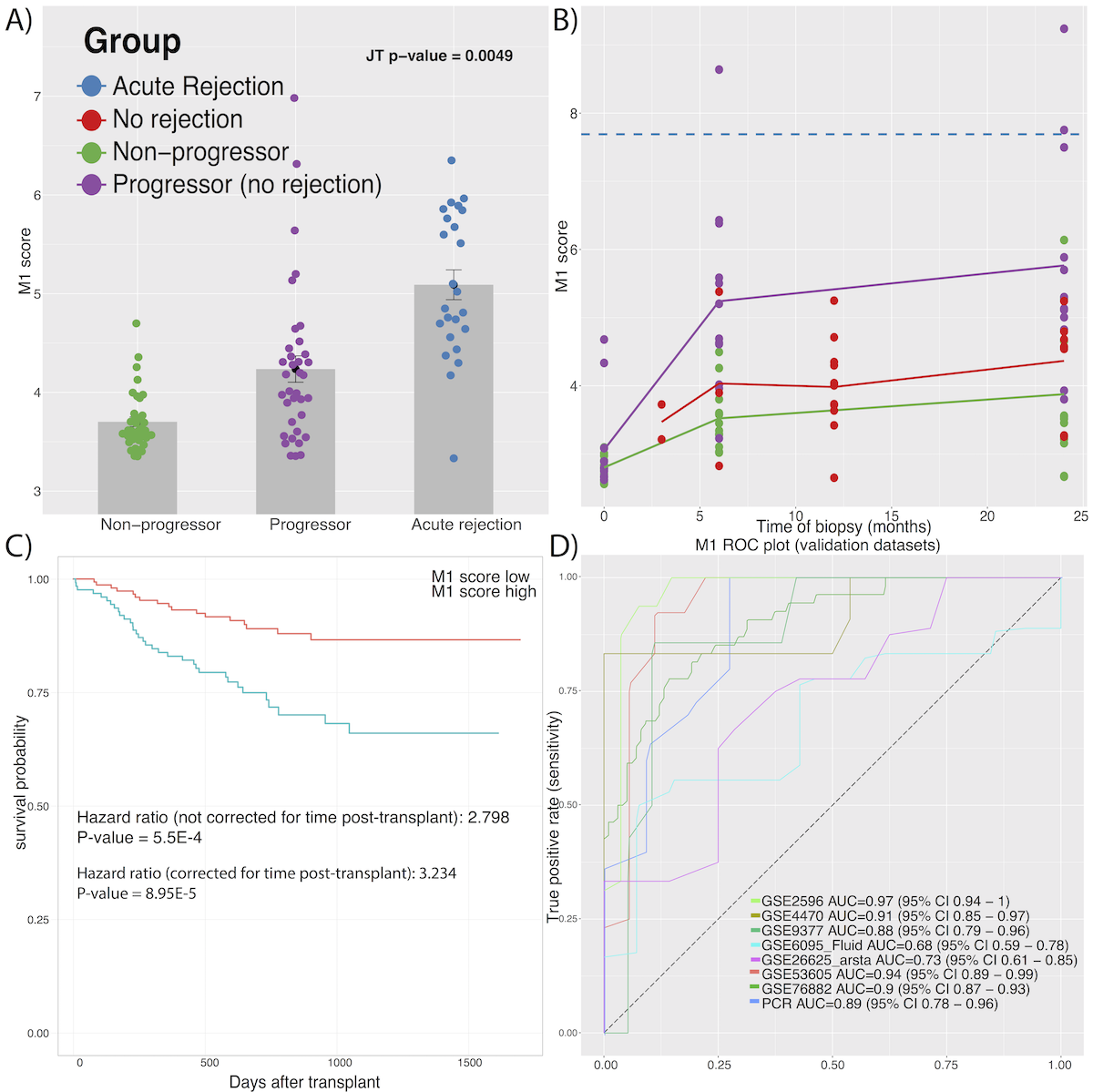Dysregulated Innate Immune Response Is a Robust Predictor of Allograft Injury and Survival Across All Transplanted Organs.
1Institute for Immunity, Transplantation and Infection, Stanford University, Stanford, CA
2University of Leuven, Leuven, Belgium
3Technion-Israel Institute of Technology, Haifa, Israel
Meeting: 2017 American Transplant Congress
Abstract number: 564
Keywords: Graft failure, Graft survival, Rejection
Session Information
Session Time: 8:00am-10:00am
 Presentation Time: 9:30am-9:45am
Presentation Time: 9:30am-9:45am
Location: Arie Crown Theater
Objective
Late allograft failure is characterized by long-term cumulative effects of subclinical allograft injury. An optimal biomarker diagnoses acute rejection (AR), correlates with ongoing graft damage, and predicts long term graft failure, facilitating accurate and targeted therapeutic intervention.
Methods
We hypothesized that inflammatory macrophages are early diagnostic and prognostic markers of allograft injury. To test, we performed a multi-cohort analysis of 16 independent transplant cohorts consisting of 1,713 graft biopsies from 4 organs (1,246 samples in 8 independent cohorts for discovery, 467 samples in 8 independent cohorts for validation) to explore the role of M1 polarized macrophages in acute and chronic rejection. We identified a parsimonious 3-gene inflammatory macrophage polarization score, called M1-score, and validated it using RT-PCR and microarrays.
Results
The M1-score diagnosed AR 8 validation cohorts of 403 allograft biopsies across four organs (mean AUC=0.85), and robustly correlated with all individual Banff diagnostic criteria used to quantify graft injury. In a longitudinal renal transplant cohort, M1-score predicted subclinical injury 18 months before clinical manifestation (AUC = 0.72), demonstrating prognostic utility. In an independent cross-sectional renal transplant cohort, the M1 signature stratified patients at high risk of long-term graft failure (HR=3.24, p=9E-5) as early as 15 days after biopsy (figure 1), further demonstrating its prognostic power. Conclusion
Conclusion
We identified and defined a 3-gene score enabling accurate diagnosis of subclinical and acute graft injury, correlating with extent of graft injury, and prognosticating progressive graft injury and failure. Our results strongly suggest an integral role for M1 macrophages in rejection pathophysiology and form the basis of a diagnostic and prognostic transplant biomarker.
CITATION INFORMATION: Azad T, Donato M, Heylen L, Shen-Orr S, Sweeney T, Naesens M, Khatri P. Dysregulated Innate Immune Response Is a Robust Predictor of Allograft Injury and Survival Across All Transplanted Organs. Am J Transplant. 2017;17 (suppl 3).
To cite this abstract in AMA style:
Azad T, Donato M, Heylen L, Shen-Orr S, Sweeney T, Naesens M, Khatri P. Dysregulated Innate Immune Response Is a Robust Predictor of Allograft Injury and Survival Across All Transplanted Organs. [abstract]. Am J Transplant. 2017; 17 (suppl 3). https://atcmeetingabstracts.com/abstract/dysregulated-innate-immune-response-is-a-robust-predictor-of-allograft-injury-and-survival-across-all-transplanted-organs/. Accessed February 20, 2026.« Back to 2017 American Transplant Congress
